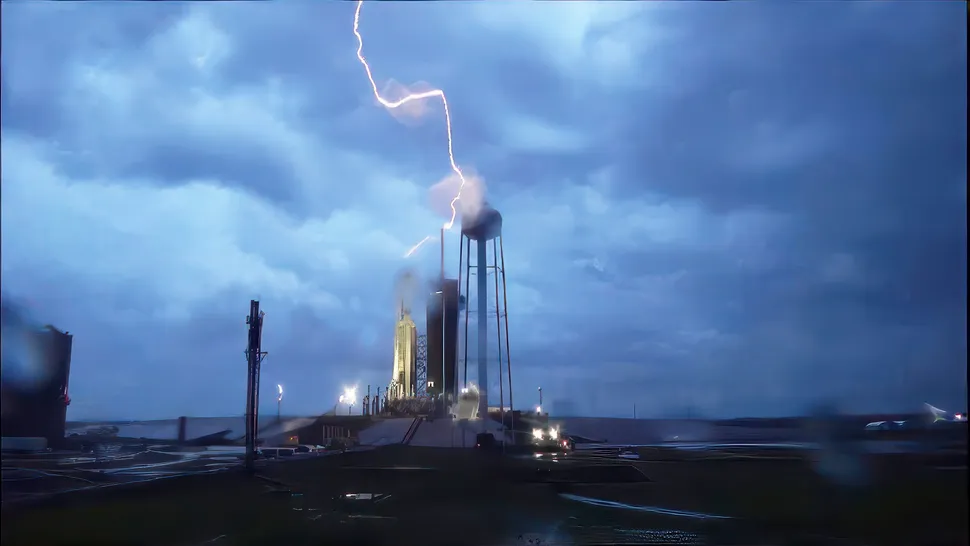 |
| Lightning strikes the launch pad as a SpaceX Falcon Heavy rocket sat awaiting liftoff on Thursday, April 27. (Image credit: SpaceX via Twitter) |
SpaceX is one of the leading space exploration companies in the world today. Known for its innovative technology and revolutionary approach, the company has been making headlines for its rocket launches and missions. In April 2023, SpaceX's Falcon Heavy rocket was set to launch a ViaSat-3 Americas satellite into orbit. However, the launch was postponed due to severe weather and lightning strikes at NASA's Kennedy Space Center in Florida. In this article, we will delve into the story of SpaceX's Falcon Heavy rocket launch pad and its encounter with lightning.
Severe Weather Conditions
On Thursday, April 27, 2023, the Kennedy Space Center in Florida experienced severe weather conditions. The center was subjected to both lightning and tornado warnings that forced the Falcon Heavy launch attempt to be scrubbed. This was a significant setback for SpaceX, as the Falcon Heavy launch was eagerly anticipated by space enthusiasts worldwide. However, the safety of the rocket and its payload was of paramount importance, and the decision to scrub the launch was a wise one.
Lightning Strikes the Launch Pad
As the storm raged on, cameras located around the launchpad captured views of lightning hitting the protection mast atop the fixed tower based at Launch Complex 39A (LC-39A). The mast is designed to divert electrical charge away from the rocket on the launchpad and safely to the ground. The lightning strike was a remarkable sight, demonstrating the power of nature and the importance of safety measures in rocket launches.
The Day After the Storm
The following day after the storm had abated, SpaceX announced via its Twitter account that engineer teams had performed additional checkouts of Falcon Heavy, the payloads, and ground support equipment. These checks appeared to show that the lightning protection mast had functioned as intended, protecting the rocket and its payload from damage. This was excellent news for SpaceX, as it meant that the rocket was still in good condition and could be launched after the necessary preparations.
Falcon Heavy Launch Rescheduled
The Falcon Heavy launch, which was intended to send a ViaSat-3 Americas satellite into orbit, was rescheduled for launch on Friday, April 28, at 7:29 p.m. EDT (2329 GMT). However, the launch was scrubbed again. This was due to technical difficulties, and SpaceX needed more time to resolve the issues. The launch was rescheduled once again for Sunday, April 30, at 8:26 p.m. EDT (0026 GMT).
Falcon Heavy Launches Successfully
On Sunday, April 30, 2023, the Falcon Heavy finally took flight, carrying the 14,000-pound (6,400 kilograms) broadband satellite. This was the sixth flight of a SpaceX Falcon Heavy rocket, which consists of three strapped-together Falcon 9 rocket first-stage units. This particular flight also carried a communications satellite called Arcturus, which will be operated by San Francisco-based Astranis Space Technologies, and an Internet-of-Things cubesat called GS-1, operated by Washington-based Gravity Space.
Falcon Heavy vs. Starship
The Falcon Heavy had been SpaceX's most powerful rocket since it was first launched in 2018, carrying the red Tesla Roadster of founder and CEO Elon Musk to an orbit around the sun until this year. However, Falcon Heavy's status was reduced by the launch of SpaceX's even more powerful Starship rocket on Thursday, April 20, 2023, at 9:33 a.m. EDT (1333 GMT). The 390 feet (120 meters) tall rocket's Raptor engines provide 16.6 million pounds of thrust on liftoff, dwarfing the not-inconsiderable liftoff thrust of 5 million pounds possessed
Here's a video of that lightning strike at the Falcon Heavy's launch pad. pic.twitter.com/YOe9a9AwQW
— Spaceflight Now (@SpaceflightNow) April 28, 2023
Last night’s storm in Florida produced hail, tornadoes, and lightning. Following this strike on the tower at 39A, teams performed additional checkouts of Falcon Heavy, the payloads, and ground support equipment pic.twitter.com/GZwCARaZTx
— SpaceX (@SpaceX) April 28, 2023



0 Comments